EisnerAmper Ireland Sponsors K Club Ryder Cup

EisnerAmper Ireland sponsored the IFSC Golf Society’s final event of the year at the K Club Ryder Cup course. David Carroll hosted the afternoon where members competed for Captain Dave Carroll’s Prize. The attendees enjoyed a memorable day of golf, networking, and friendly competition to wrap up the season.
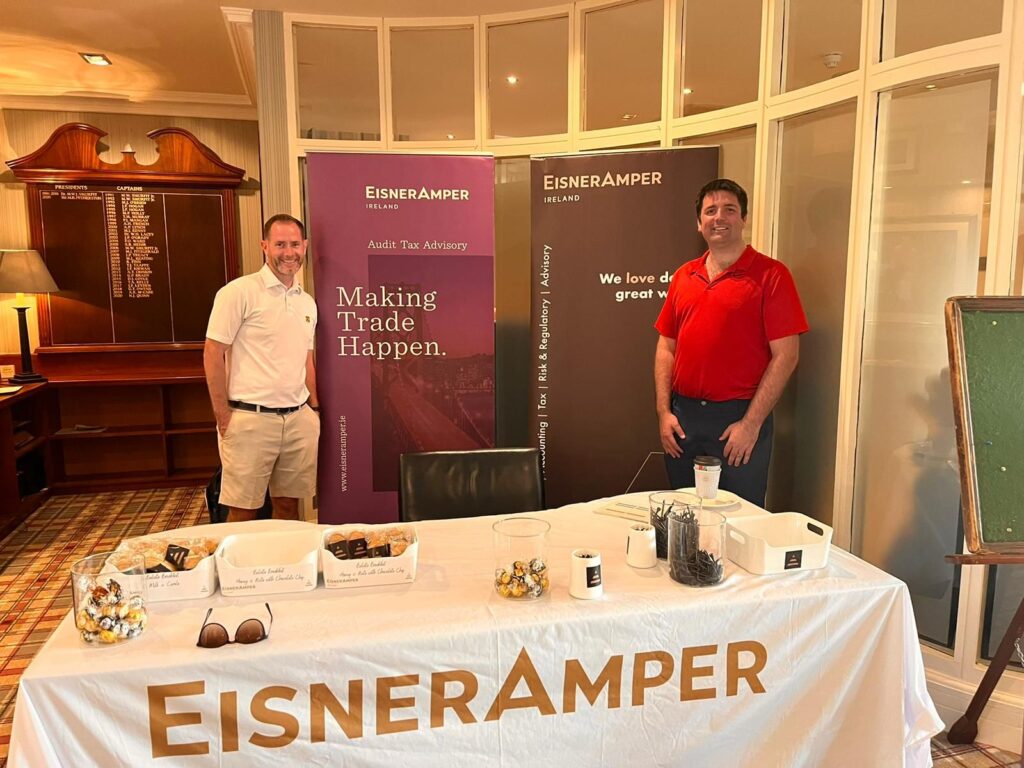
David Carroll, Partner, Head of Aviation & David Dunne, Director, Accounting & Compliance
EisnerAmper Ireland Welcomes Their 2024 Graduate Trainees
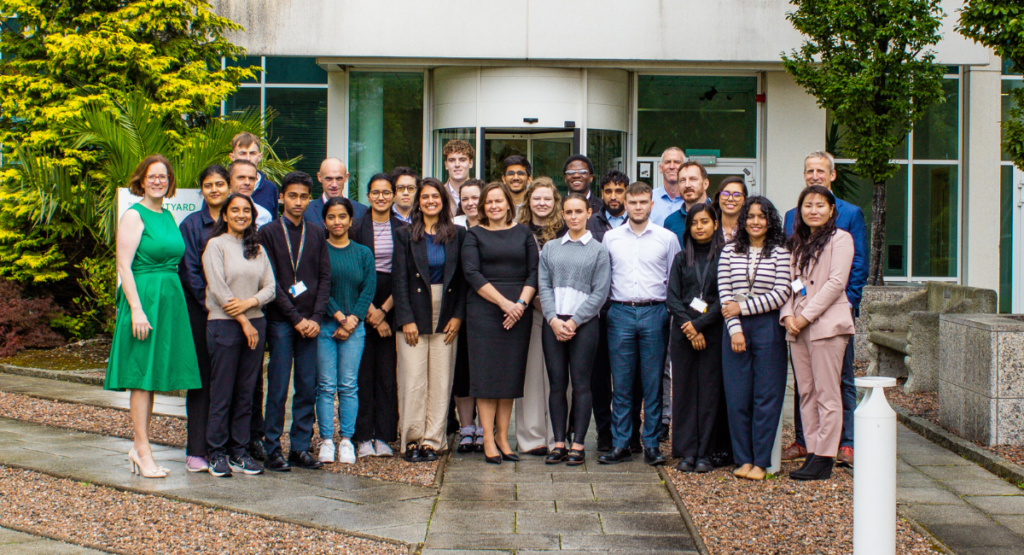
We were excited to welcome the newest members of our team as part of the 2024 Graduate Programme at EisnerAmper Ireland in September. They completed a comprehensive 2-week on-site Induction Programme, which covers technical training, practical on-the-job experience, and soft skills development. Our new Trainees gained experience in each of the Audit, Accounting & Compliance, and Tax departments.
From day one, our Trainees collaborate closely with Partners and Senior Management to deliver tailored services and solutions to our key markets. This hands-on approach ensures they gain practical experience while developing the knowledge, skills, and confidence needed for long-term career success.
If you’re looking to kick-start your career in audit, accountancy, or tax with real-world, hands-on experience at a firm that values and nurtures dedication and commitment, EisnerAmper Ireland is the perfect place for you.
To read more about Life in EisnerAmper and our career opportunities click here.
Latest News →EisnerAmper Ireland Summer BBQ 2024

The EisnerAmper Ireland team was thrilled to host our annual Summer Games and BBQ at Merrion Cricket Club. The afternoon was filled with fun and friendly competition, featuring games like mini golf, Connect Four, footpool, limbo, boules, and Jenga. The festivities continued with a delicious BBQ, refreshing drinks, and live music, making it a memorable day for everyone involved.


EisnerAmper Ireland Celebrates Pride 2024

Throughout June, we embraced Pride Month by sharing weekly internal newsletters, ‘Learn with Pride’, that highlighted LGBTQ+ movies, books, artists, businesses, and historical moments, offering insights and inspiration from the vibrant LGBTQ+ community.
We had the privilege of again hosting Shoutout at our firmwide Pride Musical Table Quiz. Shoutout, a charity dedicated to enhancing the lives of LGBTQ+ individuals, educated us with a powerful session on the history and significance of Pride. Their storytelling and educational programs underscored the importance of Pride as a global movement and reminded us of the ongoing need for inclusivity and support for LGBTQ+ communities in Ireland and around the world.

Gordon Grehan, ShoutOut, teaches us the history of Pride
Our Pride Musical Table Quiz celebrated iconic LGBTQ+ artists and anthems along with important historical LGBTQ figures, trivia and events, making for a fun and educational afternoon that highlighted the cultural contributions of LGBTQ+.



We would like to extend our thanks to Shoutout for sharing their insights and for reminding us why Pride is such a crucial celebration.
EisnerAmper Ireland would also like to wish everyone a very happy Pride month. Let’s continue to champion diversity, equity, and inclusion every day.
Latest News →ESG Discovery Afternoon with Villanova University

We were pleased to host students from Villanova University for our ESG Discovery Afternoon, offering an engaging introduction to ESG Reporting from a European perspective. The event featured a workshop on the EU’s Corporate Sustainability Reporting Directive led by Peter MacDonald, Partner, Head of ESG Advisory and insights from Troy Lavin, Managing Director of VITHIT. Attendees also saw a live demonstration of our CSRD Compliance and Reporting Software, EnSiGn and participated in an interactive exercise facilitated by Frank Keane, Partner, Risk & Regulatory.
This initiative emphasised the importance of ESG in shaping a sustainable future while giving students valuable insights into its critical role in modern business.


EisnerAmper Ireland appoints Attracta van Rensburg as Chief Executive Officer

EisnerAmper Ireland has announced the expansion of its leadership team with the appointment of Attracta van Rensburg as Chief Executive Officer. Alastair MacDonald, Partner, has been appointed Head of Strategy & Innovation and Executive Chair.
With more than 25 years in leadership positions in Irish and international financial services, Attracta has a track record serving clients, leading teams, scaling businesses and building cultures where employees can flourish. As CEO, Attracta together with the Partners and Management team, will further professionalise how EisnerAmper operates – developing its people, serving its clients, and positioning itself for future growth.
At a time of technological, regulatory and environmental change, the Firm’s appointment of Alastair as Head of Strategy & Innovation reflects its ongoing commitment to strategic leadership, driving innovative change and growth.
Alastair MacDonald, Head of Strategy & Innovation and Executive Chair, EisnerAmper Ireland, commented:
“On behalf of my fellow Partners, I am delighted to announce the appointment of Attracta to the position of CEO.
Attracta’s appointment reflects our strategy to deliver market leading sustainable services and solutions to the financial services and international trade markets through a combination of world-class talent, focus on quality, innovative use of technology, and a globally connected team.
On behalf of the team at EisnerAmper Ireland, I would like to congratulate Attracta on her appointment. I look forward to working with Attracta and wish her every success.”
Attracta van Rensburg, CEO, EisnerAmper Ireland, commented:
“I have always admired EisnerAmper Ireland’s culture – its professionalism, quality and innovation focus and its unwavering commitment to attracting and developing world-class talent.
The Firm’s values of caring, connected, collegiate, commercial, candid and can-do resonate deeply with my own personal values. I am looking forward to working with the Partners and an incredible team of professionals as we continue to serve clients and build on the Firm’s achievements.”
About EisnerAmper Ireland
EisnerAmper Ireland is a specialist firm of accountants, auditors, tax advisors and risk and regulatory experts. It has a niche focus on the financial services and international trade markets. Working alongside 4,000 professionals globally, EisnerAmper Ireland’s 16 Partners and 120+ team play a key role in driving international trade in and through Ireland and in advising Irish corporates.
EisnerAmper Ireland is a founding member of EisnerAmper Global, a specialist network of independent member firms operating via global international trading and financial services hubs.
Being part of EisnerAmper Global gives clients access to the experience and expertise of EisnerAmper’s 450 Partners and 4,000 professionals across the United States and key trading hubs globally.
Latest News →EisnerAmper Ireland Announces New Corporate Partnership

EisnerAmper Ireland is proud to announce our corporate partnership with Children In Hospital Ireland, one of Ireland’s leading children’s charities. With a team of 300 volunteers, Children In Hospital Ireland facilitates play and recreation opportunities across 14 hospitals nationwide, thereby easing the experience of hospitalisation for children and their families. Children In Hospital Ireland also provides welcoming and wayfinding services in CHI at Crumlin, Ireland’s largest paediatric hospital, and advocates on behalf of all children and their families to ensure they have access to the supports and services they need.
Jennifer Kelly, Partner and Head of CSR at EisnerAmper Ireland said, “We are delighted to be partnering with Children In Hospital Ireland for 2024. This partnership will help support children and their families before, during and after hospitalisation while bringing our employees closer together with a sense of purpose, engagement and connection.”
At EisnerAmper Ireland, we prioritise Corporate Social Responsibility and recognise the importance of supporting initiatives that positively impact our community. Through our collaboration, we are dedicated to providing financial support, volunteer hours, resources, to Children in Hospital Ireland
To learn more about the great work Children in Hospital do, click here: https://childreninhospital.ie/
To learn more about our CSR Initiatives, click here: https://eisneramper.ie/our-differentiation/corporate-social-responsibility/
Latest News →EAI for TY Programme 2024
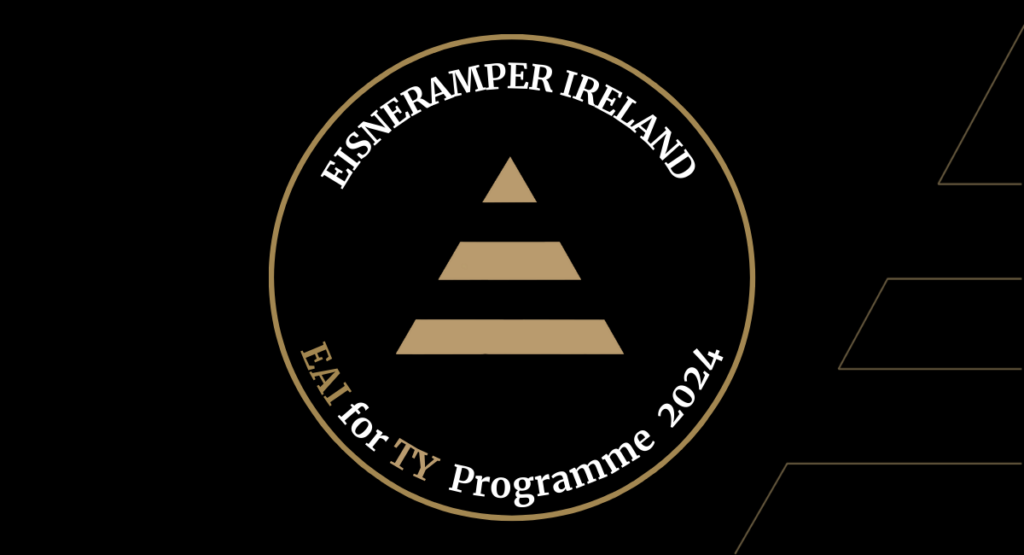
In February, EisnerAmper Ireland was delighted to host our ‘EAI for TY’ programme, specifically designed to provide Transition Year students with an immersive learning experience and valuable insights into careers in accountancy and tax.
Over the course of the week, students engaged with Partners and Management across all our departments, gaining firsthand knowledge of the profession. They also explored the critical work of our Service Excellence Team (SET) in areas such as Marketing & Communications, Risk & Quality, Sustainability, and Cybersecurity.
The highlight of the programme saw students applying their learning by researching, preparing, and presenting projects to Partners and their parents on the final day.
A huge well done to all the students for their impressive contributions and enthusiasm throughout the week!
Learning & Development →Strengthening Professional Development at EisnerAmper Ireland
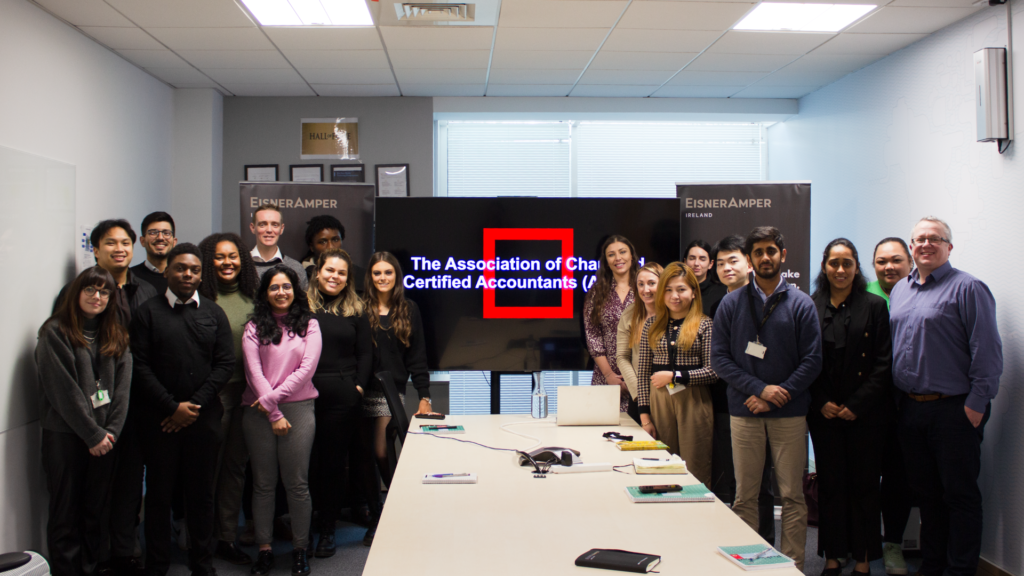
We were delighted to recently welcome Laura Cameron, Business Development Manager ACCA, to speak to our ACCA Trainees. In addition to providing an overview of the ACCA Training Programme, Laura also provided an overview of ACCA’s tools and resources including its ‘Study Hub’ and ‘Practice Platform’. As a Registered Training Firm with both Chartered Accountants Ireland (CAI) and the Association for Chartered Certified Accountants (ACCA), the development of our Trainees is core to our Firm and how we work with our clients.
If you want to kick-start your career in audit, accountancy or tax with real-world, hands-on experience, in a firm where dedication and commitment are recognised, valued and nurtured, then EisnerAmper Ireland is the place for you.
We are recruiting Trainee Chartered Accountants and Tax Advisors as part of our Graduate Programme (applications are welcome from ITI, ACA, ACCA, and CPA students).
To read more about Life in EisnerAmper and our career opportunities click here.
Learning & Development →Leinster Society of Chartered Accountants Annual Christmas Lunch

Members of the EisnerAmper Ireland Team were delighted to attend Chartered Accountants Leinster Society Annual Christmas Lunch in aid of the Jack and Jill Children’s Foundation, on Friday 8 December. In addition to raising funds for such a worthy cause, each guest brought a toy for a child which will be shared among up to 10 children’s charities.
The afternoon was a great success and our team was delighted to have the opportunity to connect with so many friends of the Firm while supporting such a wonderful cause.
If you are interested in making a Christmas contribution to Jack & Jill, please visit their website here: https://www.jackandjill.ie/
We care about business and we care about the people we work with in business.
Corporate Social Responsibility (CSR) is integral to how we do business and manage interactions, not just with our employees and clients but also our wider community and society as a whole. As a professional services firm, demonstrating ethical high performance in all aspects of our work and how we run our Firm is fundamental to our success. Learn more about our CSR policy here and our CSR initiatives here.
Contact Us
Latest News →EisnerAmper hosts Christmas Party and ‘Doing Great Work Awards’ for 2023

Last Friday, 1 December, we were delighted to hold our annual firm Christmas Party and ‘Great Work Awards’ at The Merry Ploughboy in the foothills of the Dublin mountains.
An afternoon of connecting and festive celebrations included a drinks reception, festive lunch, our annual ‘Doing Great Work Awards’ and superb live music by The Merry Ploughboys – and our very own talented musicians!
Our annual ‘Doing Great Work Awards’ cover ‘Quality’; ‘People’; ‘Operational Excellence’ and ‘Design Thinking & Growth’. They were awarded to team members who demonstrated ‘doing great work’ in 2023 across each of these areas. The winners were awarded a crystal plaque to celebrate their achievements by Liz Cahill, Head of Tax, and Frank Keane, Partner. Our winners for 2023 were:
- Quality Award
- Emma Hodgins, Assistant Manager, Tax
- Luke Murphy, Assistant Manager, Audit
- People Award
- Barbara Quinn, Receptionist, Service Excellence Team
- Conor Fitzpatrick, Trainee, Audit
- Operational Excellence Award
- Carla Burke, Semi-Senior, Tax
- Lisa Winstanley, Operations Manager, Service Excellence Team
- Design Thinking & Growth Award
- Lauryn Foley, Semi-Senior, Accounting & Compliance
- David Mangan, Junior Solutions Builder, Solutions Team
A big thank you to the members of our team and to the Merry Ploughboy who organized and facilitated such a festive and fun afternoon.
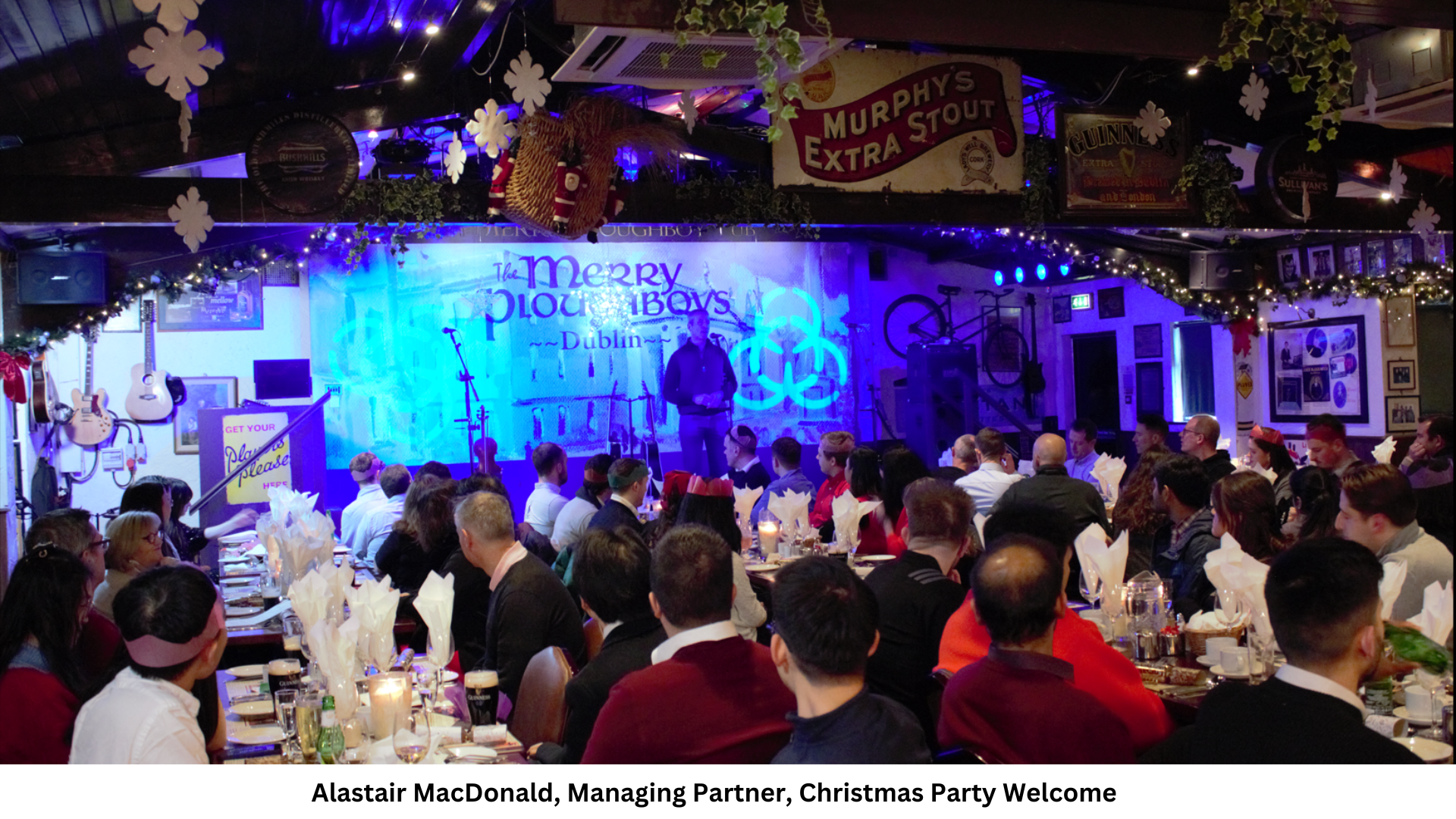



We care about business and we care about the people we work with in business.
Corporate Social Responsibility (CSR) is integral to how we do business and manage interactions, not just with our employees and clients but also our wider community and society as a whole. As a professional services firm, demonstrating ethical high performance in all aspects of our work and how we run our Firm is fundamental to our success. Learn more about our CSR policy here and our CSR initiatives here.
Contact Us
Latest News →EisnerAmper Ireland at The Gloss Gala 2023

On November 15, our colleagues Jennifer Kelly, Partner, Accounting & Compliance, Carina Myles, Partner, Governance, Risk & Compliance, Karen Moloney, Director, Accounting & Compliance, and Annmarie Brophy, Director, had the pleasure of attending The Gloss Gala, in association with Goodbody, one of Ireland’s most glamorous and high-profile events for professional women. Held at the RDS, this annual occasion has been a highlight in the Irish social calendar since 2009, and this year’s edition did not disappoint.
The Gloss Gala is a celebration of women in business, blending style, sophistication, and inspiration. The event was a fusion of a creative scene setting, a great atmosphere, a champagne supper, and guest speaker Bafta-winning broadcast journalist Kirsty Wark.

Annmarie Brophy, Director & Karen Moloney, Director
With a diverse audience of 1,600 attendees representing various sectors, from entrepreneurs to legal finance, consulting, recruitment, banking, SMEs, media, and tech, the event offered a unique opportunity to network, entertain colleagues and clients, and connect with fellow women in business. It was an evening of relaxation, empowerment, and, of course, high fashion.
One of the highlights of the evening was The Look Business fashion show, which unfolded on a 30-meter catwalk. It was a showcase of the best that Irish retail has to offer, providing a captivating spectacle for all in attendance.
EisnerAmper Ireland was honored to be part of this unforgettable evening, and we look forward to sharing the insights and experiences gained from The Gloss Gala 2023 with our colleagues and clients. As we reflect on this memorable night, we are grateful for the opportunity to be part of Ireland’s most impactful event for professional women and look forward to future gatherings that will continue to empower and connect women in business across the nation.
Latest News →
- ←« Previous Page
- 1
- 2
- 3
- 4
- 5
- …
- 39
- →Next Page »


